Turning Outward: Our Anti-Racism Journey in Oak Park
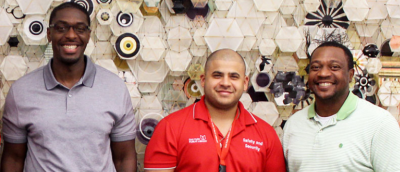
Pictured (left to right): Manager of Teen Services Stephen Jackson; Manager of Public Safety Aaron Alonzo; Social Services Director Robert Simmons
Authored by Robert Simmons, Director of Social Services and Public Safety, Oak Park Public Library
Learning how to neutralize what has been considered “racially charged” language to become better equipped to share dialogue on this difficult and challenging topic has been crucial. Words like white supremacy, privilege, allyship, white fragility, entitlement and reparations can unravel discourse if they aren’t neutralized and accepted.
The Village of Oak Park is a suburb located 10 miles immediately west of downtown Chicago with approximately 53,000 residents. It’s often described as an ethnically diverse community and is recognized for being the birthplace of Ernest Hemingway and a place where world-renowned architect Frank Lloyd Wright once resided.
I’ve worked in Oak Park as a social worker for 15 years, helping people gain equitable access to housing, education and health care. In 2016, I started my role as the director of social services and public safety at the Oak Park Public Library. At that time, I was one of the first social workers hired by a public library in the country.
Our innovative social services and public safety model is designed to serve patrons experiencing homelessness, mental illness and social isolation. Today, we provide resources such as: free mental health assessments, educational support for low-income students, supportive housing advocacy and employment assistance.
Replacing an externally contracted security guard model with a social services and public safety approach in 2016 was one of the first major changes to come from the library's efforts to “turn outward”— making intentional choices that ground library work in our community's shared aspirations. We have continued to turn outward in our community. In February 2020, our library began another journey — taking a deeper dive into examining race and social equity in the organization and community. The journey that I’m referring to is an anti-racism journey.
In early 2020, our leadership team met to carefully deliberate about what type of equity, diversity and inclusion work we wanted to introduce to the organization. Our Executive Director David Seleb emphasized his intention that our equity, diversity and inclusion training be specifically focused on examining race and social equity. As the only Black member of our leadership team, my reaction was, “Sign me up!”
Now almost one year later, we are continuing our work with consultant Reesheda Graham Washington and RGW Consulting, LLC. Reesheda’s international experience and local awareness make her uniquely positioned to lead our organization. She offers a perspective that goes beyond subject matter expertise related to race and social equity work. The methodologies she has introduced to examine race and social equity are very comprehensive. She has engaged every staff member, board member and key community stakeholders. She is also highly engaged within the community as a community organizer, an Oak Park Black business owner and a trusted race and social equity advisor in the community.
Before beginning any formal training, we engaged in a process of discovery to determine the organization’s strengths and weaknesses. In February, Reesheda spent a week interviewing and listening to a cross section of more than 50 library stakeholders including the leadership team, board members, team managers and community members. She also spoke with library stakeholders who represent particular affinity group members based on gender, race, sexual orientation, age, ability and interests/passions to illuminate some of the root causes that impact the library’s culture and climate, specifically as it pertains to practices of racist and anti-racist behaviors. This process helped determine where our library was, and how we were positioned to embark on an anti-racism journey.
Shared language exercises have helped the library gain common language as it pertains to terminology that impacts racism. Learning how to neutralize what has been considered “racially charged” language to become better equipped to share dialogue on this difficult and challenging topic has been crucial. Words like white supremacy, privilege, allyship, white fragility, entitlement and reparations can unravel discourse if they aren’t neutralized and accepted.
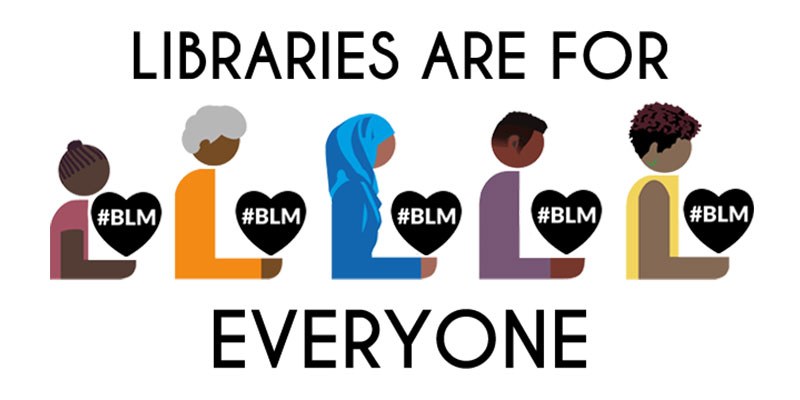
Graphic by Hafuboti
All library staff have had the opportunity to engage with Reesheda and each other in a safe space to discuss what being a victim and/or perpetrator of racism is like. This exercise was very powerful. It was an emotional session where you had to challenge yourself to be vulnerable as you process how racism affects you personally. The exercise provided staff an opportunity to get to know each other in a totally different context.
An anti-racism advisory team (including library staff and community members) has been created to develop a comprehensive year-long anti-racism strategic plan that includes activities, benchmarks and communications for integration into the library’s overall 2021 strategic plan. Reesheda will continue work with the team to construct a PR plan to prepare patrons and the larger community for the strategic plan that will roll out in 2021.
There are several additional ways that our library is implementing anti-racism work into our organization. This includes:
- Creating budget lines earmarked for race and social equity initiatives, programs and projects;
- Expanding our adult and teen One Book, One Community summer reading model with a full-year focused on promotion of library and popular culture resources curated by library staff in “Anti-Racism: A Starter’s Guide” and “Countering Anti-Black Sentiments.”
We will be using an equity lens protocol tool to measure and evaluate our anti-racism work. The tool will help us determine outcomes, review numbers and narratives, measure benefits and burdens and identify who is accountable. How we measure and evaluate our success and challenges on this journey is paramount as we do this important work.
The next two years of our anti-racism work will help build a new foundation for the library that will hopefully last for generations. Equitable, diverse and inclusive environments are beneficial to everyone.
My participation on the Urban Libraries Council’s Anti-Racism action team has helped me tremendously during this time. Hearing diverse perspectives about race and social equity from library leaders across North America has made me a stronger leader. I understand that every library might not be prepared to embark on an anti-racism journey for many reasons at the moment. However, I do hope that sharing Oak Park Public Library’s anti-racism journey will inspire you to embark on a similar journey in your library.
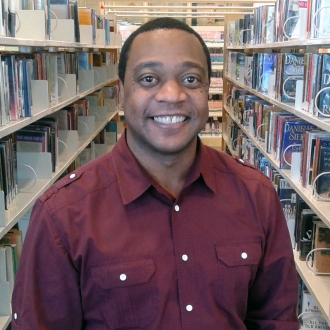
Robert Simmons
Director of Social Services and Public Safety, Oak Park Public Library
Robert Simmons started his role as director of social services and public safety at Oak Park Public Library in March of 2016. Robert is one of the first library social workers in the United States. He earned a bachelor’s degree in human and organizational development from Vanderbilt University and a master’s degree in social service administration from The University of Chicago. Robert is currently a member of ULC's Anti-Racism action team, one of six member-led teams spearheading ULC's Going Forward from the Pandemic Initiative.
Related Articles
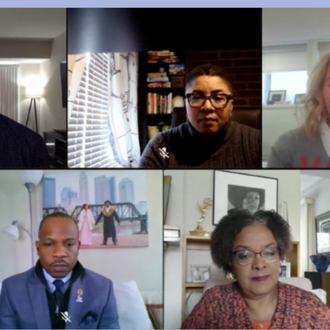
Speak Up/Speak Out: Conversations on Race in Columbus
Columbus Metropolitan Library
Discover how Columbus Metropolitan Library committed to a strong and sustained effort to combat racial inequity in their organization and community, focusing on the Black experience specifically and making race conversations a priority.
Learn More
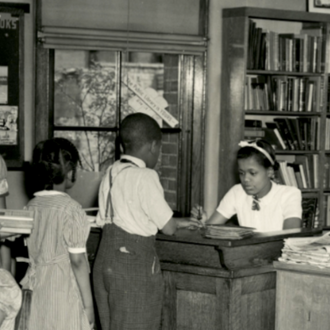
Honoring Black History in Cincinnati
Cincinnati & Hamilton County Public Library
Learn how the library’s Black Events and Exhibits Committee creates experiences, services and resources that are reflective of the Black experience in their city and county.
